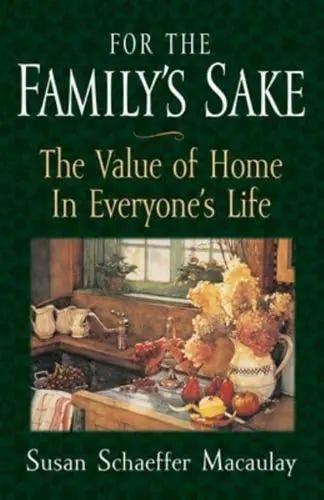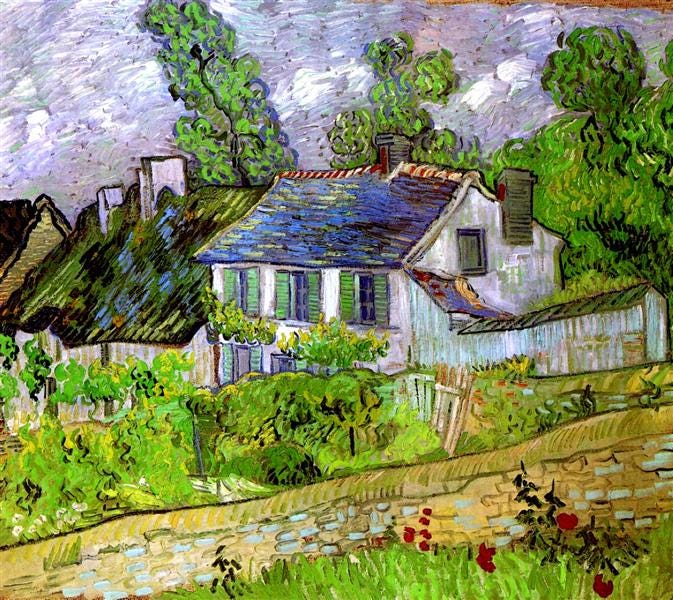About three years ago I hosted a book study of For the Family’s Sake by Susan Schaeffer Macaulay on my WordPress blog. As that blog is no longer active, I’m transferring it here to Substack. This is the Introduction, Preface, and thoughts on Chapter 1.
Susan Schaeffer Macaulay grew up in Switzerland at L’Abri Fellowship, which was founded by her parents Francis and Edith Schaeffer. She and her husband Ranald Macaulay established and led the L’Abri branch in England for several years. She is best known for her book For the Children’s Sake which helped to bring the ideas of the 19th Century educational philosopher, Charlotte Mason, to a new generation. The author also contributed to Books Children Love and When Children Love to Learn.
For the Family’s Sake focusses on the value of home in everyone’s life, married or single; divorced or widowed.
Years ago, Edith Schaeffer wrote about family life in a way that helped me rethink and understand the importance of ‘home’ after the fallout from my parent’s divorce. Her daughter’s book, first published in 1999, speaks into our modern lives, into our busy digital society, to give us a vision and blueprint for ‘home’ at a time when it seems to be eroding.
Macaulay’s idea of ‘home’ is one of beauty, attainable and realistic. I appreciate that she understands that life can be hard, but doesn’t let that be an excuse to give up and become bitter about not having the life we might dream about.
There are fourteen chapters in this 286-page book. Some are quite short but others are a fair bit longer. My plan is to read approximately one chapter per week, write about it when I’ve finished, and generate some discussion about what we’ve read. I’m not going to be rigid about the chapter per week but that’s my initial aim. A particularly long chapter can be spread over two weeks.
If you’ve read this book before, feel free to add your insights. It’s been a long time since I first read it, and I’m surprised that considering the popularity of For the Children’s Sake that this book isn’t as well known. It deserves to be, and I hope in a small way to bring it to the attention of more people.
Some reflections on the Preface and Chapter 1. Unless noted otherwise, quotations are from the book.
The concept of ‘home’ and ‘home maker’ is in many ways being relegated to history.
We all need a fresh look at what we’re aiming for at home. We need to discover a balance in our practical lives that is life-giving and works well.
‘Is it worthwhile to give generous time and energy to the home. Is it necessary? And what should the home look like?
What do the most vulnerable of persons, little children, need?
Are homes just a temporary arrangement for the care and development of children?'
Who Needs a Home?
In 2013, Moth and Raynor Winn, a couple in their early fifties, lost the home they had shared for over twenty years. They had spent those years bringing up two children and rebuilding a ruined farmhouse and its surrounding land in Wales. It had been their home and their livelihood, but a failed financial investment left them liable for debts and they lost everything. On top of all that, just a day later, Moth was diagnosed with a terminal illness, corticobasal degeneration (CBD).
They were homeless.
The Salt Path is Raynor Winn’s account of how they coped with their dilemma, which was to walk the 630-mile Southwest Coast Path of England, camping in the wild and surviving on a small allowance which hardly covered the cost of their food.
Who needs a home? The Winns certainly did. The walk was only a temporary solution.
As Susan Schaeffer Macaulay observed, if you were to ask a miserable refugee that question, they would think it a question not worth answering.
'What is a tree without its roots held deeply in the soil? What is a cup without a saucer? What are letters if they aren’t put into words and sentences? What is a child’s life like if there is no home and no family to belong to?'
For The Family’s Sake addresses these questions and many more. Home is not just for families. Single people of all ages, divorced, widowed, empty nesters; we all need a home.
I’ve never been homeless, but I have been rootless.
In my teens I lived for a while in a caravan with six other members of my family. It was a roof over our heads but it wasn’t a home. Later I spent about a year travelling around Australia, basically living in my van. Although I told myself I was a free spirit, I was really running away. I didn't want to be tethered - that sounded boring - but I learned the hard way that I needed stability and relationships.
When I became a Christian at 19, I began to sense that I needed to be tethered; to have some sort of continuity in my life. I had to learn to make a home wherever I was. To have some sort of continuity in my life.
A Utopian view that ‘when we can afford a bigger/nicer/better home…then we will take steps to put down roots;' romantic dreams that dissipate in the cold light of day; the ‘If only…’ excuse, can lead to bitterness and hopelessness:
‘If only I were married.’
‘If only I were married to another person.’
‘If only we could leave this miserable home and have a nice place.’
If only my spouse had not died/left me?Homes are for everybody - single persons or families with children, young or old, people with good jobs or bad ones. Homes are not a romantic idea to dream about wistfully; homemaking needs to be put into practice as a priority. A good home life is too basic a human need to whine and fuss about with the plaintive words, “if only.”
Unrealistic expectations may cause dissatisfaction with simple basics. We need to ask what ingredients make up a good home.
Macauley points out that a mixture of common sense, realism, and traditions have worked in the past and we should look at how different kinds of people have made a success of life. 'Our needs haven’t changed but today we have overcomplicated and stressed our lives, minds and bodies with the “too much” that we have lost a “pearl of great price”: the basics of wholesome everyday life at home. A balanced life.’
May we all live rooted and generous lives!
Some questions to consider:
How much do commercial and social media pressures mislead me and breed discontent?
Am I making excuses for not working at my everyday life? (“If only I had more money;” I didn’t have a good childhood model.”)
Is homemaking a priority? Am I putting in the thought and action to create a welcoming home?
What 'if only' is preventing me from creating a balanced home life?
Is there something practical I can do in the next week to put some good patterns into place? Some 'if only' I can delete from my thinking?
One of the most important aspects of life is the home. And then communities of homes.
Have I put down roots where I’m living? Do I belong to a broader community? I read The Salt Path with a couple of friends and what surprised us all was the couple's lack of a broader community that could have stepped in and helped them. My reading friends and I are all connected to churches and extended families who would make space for us.
Community and hospitality are areas that Schaeffer explores later on in the book. It’s something I feel strongly about because as a single person, I was made welcome in a home that opened its doors to me. A family who barely knew me made me one of them when I was rootless and alone.
I'm finding that even though I've read For the Family's Sake before, there are so many ideas to mull over. I had six children under twelve when I first read this book and we had just moved from a home we'd been in for ten years. I was shocked that I felt so uprooted when we left. Over those ten years I'd put down roots, we'd been part of a local community and six of our seven children had been born while we there. Roots don't establish themselves overnight and it's important not to give up when relationships and community take a while to develop. Roots are amazingly tenacious and create disruption when pulled up. We all need to put roots down in order that we may grow and be nourished.
Further Reading
L’ Abri by Edith Schaeffer - ‘In 1955 an American family moved into a chalet on the side of a steep Swiss alp. They did not know exactly why God had brought them there, what He wanted them to do, or even where the money to live on would come from. But He began opening doors, and people with questions about life's meaning began finding the way to their home.’
The Hidden Art of Homemaking by Edith Schaeffer (Bethany @ is hosting a seasonal slow-read of this book)
For the Children’s Sake by Susan Schaeffer Macaulay
The Salt Path by Raynor Winn - a personal account of a couple who became homeless overnight and the attitudes they encountered. It's a look into the hidden homeless; the 'ordinary' people who are forced out on to the streets due to a change in circumstances.
Fictional Books with a Heart for the Home
The Home-Maker by Dorothy Canfield Fisher - I loved this story of how a father and mother didn't let cultural norms rule them but found a solution to how they could best nurture their children.
Glimpses of the Moon by Edith Wharton - some of my thoughts on a part of this book that shows the importance of 'feeding our children only on things worth caring for,' and that the best atmosphere is made and not bought. Very refreshing.
The Little House books by Laura Ingalls Wilder - fictionalised stories of the author's life that shows how her mother made do in difficult circumstances.
The Hobbit by J.R. Tolkien
Pilgrim’s Inn by Elizabeth Goudge - many of this author’s books are centred around home & belonging.
If you enjoyed this article feel free to share it!






The changing shape of home has been on my mind often the last year, as three of my children have moved away for school, the beginning of their own journey to leave and return, and ultimately to create their own home. So I really appreciate this, Carol!
I’ve read For the Children’s Sake several times but have never read this one! I’ve just ordered it. Happy to read along! And thank you for the mention, too!
My reading theme for this year is “home” and I’ve been eyeing this book so seems like perfect timing! Enjoyed reading this post. 💗